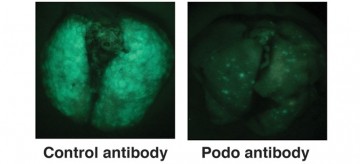
A side-by-side comparison of lung metastases showing the control antibody on the left and the podocalyxin antibody on the right. Researchers developed the podocalyxin antibody and found that it slowed tumour growth and spread.
In a study recently published in Breast Cancer Research, researchers describe how inhibiting podocalyxin, a protein marker found in many highly aggressive tumours, dramatically slowed the growth and metastasis of these tumours in mice. In collaboration with the Centre for Drug Research and Development, they also developed an antibody that targets podocalyxin, and found that it slows tumour growth and spread.
“It really, really knocks down the invasiveness of the cells and their ability to migrate and spread to other sites in the body, which is the hard thing to treat in metastatic cancer,” explains Dr. Kelly McNagny of UBC’s Biomedical Research Centre.

Dr. Kelly McNagny
Podocalyxin is associated with about five percent of breast cancers, the majority of ovarian cancers, and subsets of colon, renal and bladder cancers. Earlier studies by the same group of researchers and others have shown that its presence in tumours correlates with disease progression and poor survival.
“In most cases, if you have this particular marker on your primary tumour, you’re much more likely to have a poor disease outcome later,” says McNagny. “Our data suggest that expression of this protein enhances the ability of a subset of tumour cells to spread to other sites in the body, and this new antibody inhibits that process.”
This latest discovery offers additional hope for those suffering from metastatic disease. McNagny’s team plans to do further testing of their results, including toxicology studies on the antibody they developed.
This research was supported by an operating grant from the Canadian Institutes of Health Research and an Impact grant from the Stem Cell Network Centre of Excellence. It was the result of a strong collaboration between the UBC laboratories led by Kelly McNagny and Calvin Roskelley, and the Centre for Drug Research and Development led by John Babcook.
This research was honoured with a Distinguished Master’s Thesis STEM Award for the Biological Sciences from the Western Association of Graduate Studies (WAGS/UMI), awarded to UBC MSc graduate Kimberly Snyder, one of the lead authors of the study. Her thesis was selected from nominees representing 89 graduate schools in 13 U.S. states and three Canadian provinces in western North America.